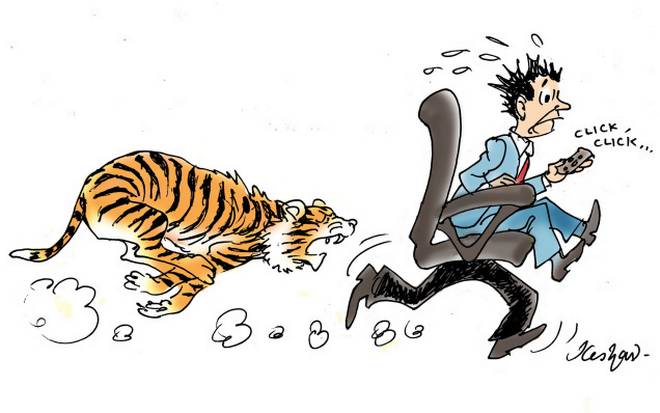Today is Mental Health Day. I honor all those who struggle with their mental health and have taken steps to better understand and befriend this intricate and tricky brain and mind of ours. For some, it is too much to ask to befriend. I realize that. For many of us, it is a bit easier and yet, still, not that easy.
Our brain is complex and I admit what I write here is simplifying reality. We inherited it from a million years of evolution. And there is a mismatch between how our brain is designed and the world we live in: everything is faster, there is much, much more of just about everything, and the levels of possibilities, uncertainties and ambiguities have increased. Our parents and generations before them lived and worked in a different context. When they grow up, our children will live in yet another reality. The general mismatch results in us relating to challenges and threats in sometimes supportive and sometimes utterly non-supportive ways and these unhelpful habits can be persistent though not impossible to transform.
The oldest part of our brain allows us to react instinctively and emotionally. Useful when we are in real danger, even life and death situations, and when anger, mourning or ecstasy serve a healing purpose. The newest part of our brain allows us to think more rationally and creatively. So important in order to help us sustain and increase our flexibility, to fantasize and imagine other possibilities and solutions.
When we are under stress, a little or a lot, the new part of our brain works less effectively or shuts down and the older parts kick into action. Not so handy if you aren’t an antelope in the Savannah whose sole survival depends on its instinctual ability to detect danger and get out of harm’s way as quickly as possible in whatever way possible: fight, run away, play dead (Freeze) or appease (play nice) for example. Some of us who are anxious feel like that antelope when we need to make a presentation in front of even a few people. It feels like life and death. The same instincts roll in. But of course, that antelope would have a good laugh. We aren’t in any real danger. But it feels real and our impulses are quite the same: we would prefer to run out the door than give that talk. Some of us might go blank (freeze) and others are going to fight with their anxiety, resist it, hoping it might go away.
I am able to be more compassionate with my unhelpful thoughts or emotions and monkey mind because I have studied the workings of the brain and mind. Thanks to insight meditation which I practice and teach, I have grown to understand and appreciate my brain and mind more and more. It helps me befriend the anxiety that comes up in me about an upcoming training or the fantasy world I create about an upcoming date.
You could say the brain is both a gift and a curse. We are able to face challenges with amazing creativity and with utter destructiveness. We have the ability to be compassionate and ruthless. This has a profound effect on our health, the health of our relationships at home and at work and the health of communities and the world at large.
Let’s remind ourselves that we can’t always help how we react because of this tricky brain we are born with that does not always function in a harmonious way with the situations we face. We need to learn to live with it. We can either be pissed off with it or indifferent or choose to relate to it with wisdom and compassion. This does not leave us off the hook. We need to take responsibility for our actions especially when they are hurtful to ourselves or others.
So what is there do with this brain and mind of ours? Mindfulness meditation helps us become aware of how our body, mind and emotions respond to situations that are challenging or threatening. It teaches us to observe and not associate ourselves with all those thoughts and emotions because most of them come and eventually go, like events in our lives. And most of the time, they are not congruent with the reality of the situation. On the meditation cushion, we practice letting them go. We train our mind to be more flexible and to be a little less victim of the evolutionary mismatch.
We also need to face it. We are not designed for our times, no matter how much we might like it to be different. We need to consider making some changes about not only how we relate to situations in our lives, our mindset, but also how we live our lives. Our minds are a reflection of our lives. If we want a calmer mind, we are going to have to make clear choices to integrate more calm into our lives.
Intrigued, join one of my mindfulness-based stress reduction course and see for yourself!
See this page for more information: https://graceandgrit.nl/mindfulness/8-week-mindfulness-stress-reduction-training/

